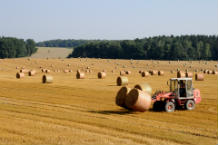articles

There is a significant difference between the Nature Friendly Farming Network and Agro-Ecology
Professor Michael Winter cited in House of Lords debate on the Agriculture Bill
The House of Lords has been debating the Agriculture Bill this week, including an amendment specifically referring to agroecology. Lord Blencathra spoke as follows in the debate on the 14th July:
I was interested that the noble Baroness, Lady Ritchie, kept referring to “nature-friendly farming” in her excellent speech. I have had the benefit of looking at examples of farms in the agroecology network and the Nature Friendly Farming Network and, while both do excellent work, it is important that we get it right if we build either of these terms into legislation.
I am grateful to my friend Professor Michael Winter of Exeter University, the UK-renowned expert on this subject, who is also on the board of Natural England. He has briefed me as follows: “There is a significant difference between the Nature Friendly Farming Network and Agro-Ecology. The Nature Friendly Farming Network is a broad grouping that includes organic and the Linking the Environment And Farming the LEAF/integrated approaches. Agro-ecology dates back to the 1980s and the term was coined by a Chilean scientist (now a professor at Berkeley) called Miguel A. Altieri. It is resolutely organic and anti-GM, and closely linked to the food sovereignty movement. In the UK, agroecology has been adopted by the Landworkers’ Alliance. There are many things to commend agro-ecology but it is not easily compatible with mainstream broadacre UK agriculture, and I am sceptical about the hegemony of organics and the wholesale opposition to mainstream food retailers.”
Professor Winter goes on to say: “I advocate three things in this space: 1) more policy attention and encouragement to agro-ecology as just one part of the tapestry of ensuring faming becomes more nature-friendly; 2) a pragmatic acceptance that most UK agriculture for the foreseeable future is not likely to radically divorce itself from the conventional food chain (as advocated by the Landworkers’ Alliance), and therefore that LEAF/integrated and nature-friendly approaches are needed within the mainstream food system; and 3) the need to encourage research that bridges the gap between the agro-ecology-based approach and the conventional Research Council/Sustainable Intensification approach.” In light of that, I am content that any amendments that mention nature-friendly farming are opposed to those that advocate agroecology, unless they are part of a nature-friendly farming system, which I passionately support.
